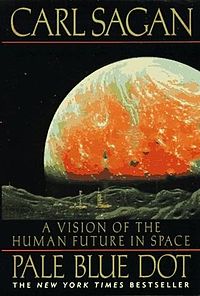Pale Blue Dot
11/04/12 19:45
Carl Sagan, Pale Blue Dot: A Vision of the Human Future in Space (New York: Ballantine, 1994)

And, Sagan is more religious than he admits. He is hopelessly romantic. How else can you explain the amount of effort he put into creating a soundtrack to travel with the Voyager spacecraft on their journey out of our solar system?
He is a good writer. And he has, in his descriptions of the universe, captured some of the awe and wonder that makes it seem beautiful. His speculations about how future generations will look upon the universe are speculative, but fun speculations. As to the necessity of settlement of other worlds, he didn’t quite make his case, I fear, but the argument is at least cogent.
The book is a good read, especially for someone who enjoys philosophy. There is something genuinely amazing about a cosmology in this time of understanding how vast the cosmos really is.